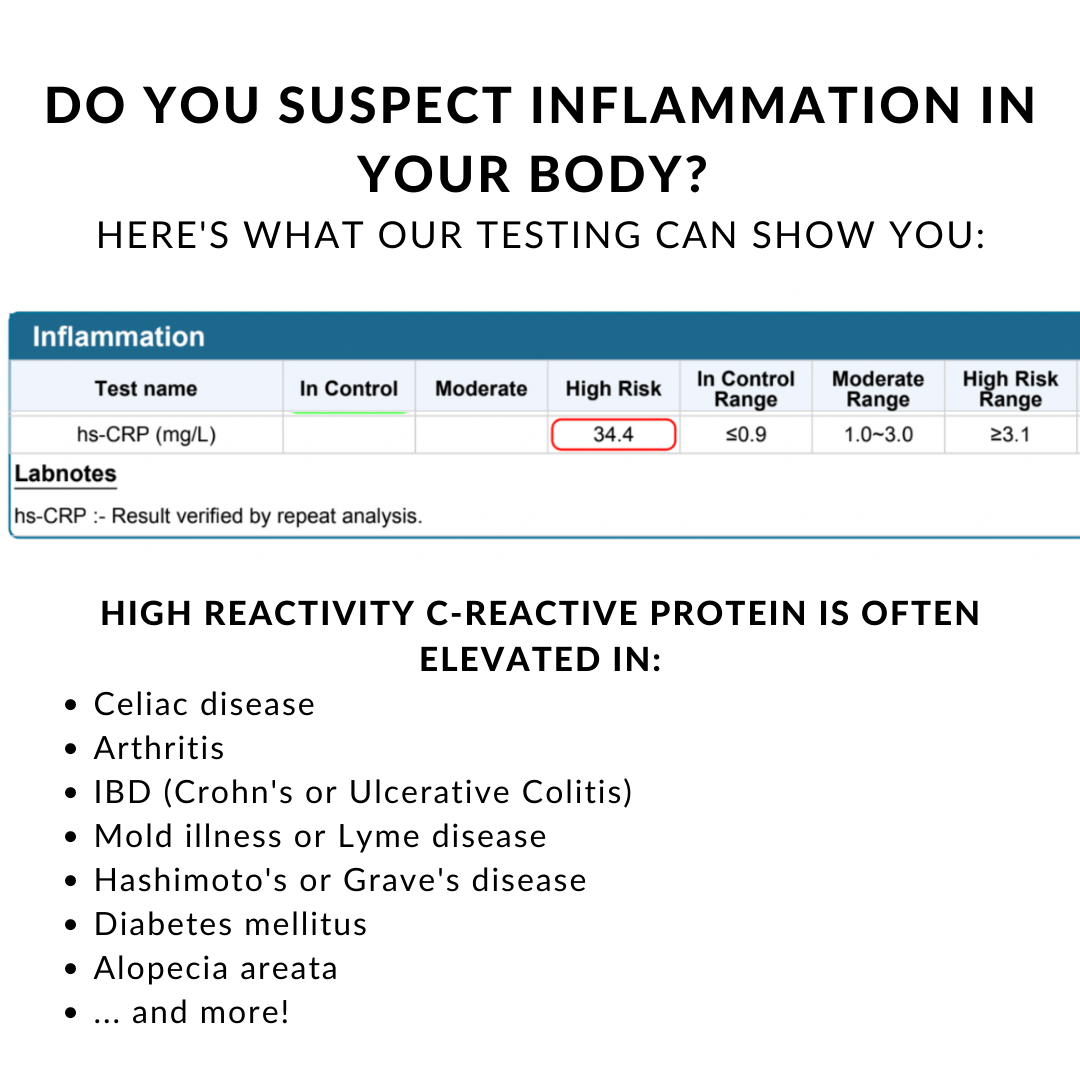Your Labs Say WHAT About Inflammation?
In order to function properly, our bodies undergo routine biological processes. However, if your body notices a threat or that something isn’t right, inflammation is one of the key markers. Many of us don’t even know we have inflammation in our bodies!
Before getting into specific lab testing, let’s dive into a little more detail about inflammation.
What is Inflammation?
Inflammation is a biological process that signals to your body that there is cell damage. This is useful in short-term situations, such as healing a cut or bruise, or recovering from an injury. However, inflammation is NOT useful when it is chronic. The process of damaged cells that typically get repaired and replaced with healthy cells does not occur with chronic inflammation.
Chronic inflammation can show up as:
- difficulty losing weight or weight gain
- brain fog
- headaches and migraines
- fatigue
- bloating or gas pain
- insomnia
- decreased thyroid function
- … and more!
It is important to get to the root cause of these concerns by utilizing extensive functional medicine laboratory testing. If chronic inflammation goes untreated, it can lead to many chronic diseases such as diabetes, heart disease, metabolic syndrome, and even some types of cancer.
HS-CRP and Homocysteine
At Rachel Scheer Nutrition, we love data! During our Functional Wellness Coaching program, we run a wide array of labs to test for everything from micronutrient levels, thyroid, GI health, and inflammation. Two of the markers we look at for broad spectrum inflammation are high-sensitivity C-reactive protein (Hs-CRP) and homocysteine.

Hs-CRP is one of the most common inflammatory markers in the body. Hs-CRP has been linked to infection, inflammation, or potential for developing a chronic disease. Elevated Hs-CRP, if left untreated, can lead to many health concerns, such as heart disease and stroke. The blood sample provided gives us an in-depth look at your Hs-CRP level. It can also affect our treatment strategy and nutrition game plan.
On the other hand, homocysteine is another key marker associated with inflammation. In addition, it also is a key biochemical marker for assessing methylation. Methylation is responsible for a lot of important processes, such as hormone balance, metabolism, and detoxification. When homocysteine is high, the mitochondria is also impacted. The mitochondria is especially known for producing ATP (adenosine triphosphate), which is a major energy substrate.
With this information in mind, we can get a good picture of what your inflammatory status is. If inflammation is present, we will not only come up with a treatment plan, but also create a specific nutrition, exercise, and lifestyle plan to best meet your goals!
Conditions Associated with Inflammation
As mentioned above, inflammation is linked to a lot of conditions, including arthritis, diabetes, autoimmune diseases, certain cancers, and chronic migraines. Additionally, it can contribute to several GI-related conditions, such as leaky gut and gut dysbiosis. Beyond diagnoses, it can make you feel less than optimal – something none of us want.
Nutrition Tips
Eating well-balanced, regular meals consistently is key to keeping inflammation low. But what exactly should you include at each meal?
Here are some key tips:
- Aim for whole foods and eliminate processed foods
- Don’t skip meals! Eat three meals regularly throughout the day
- Choose minimally processed, natural lean protein options like turkey, chicken, grass-fed beef, seafood, and fish
- Eat the rainbow! Fill your plate with colorful non-starchy vegetables and add fruit on the side
- Add curcumin/turmeric to your protein and vegetables
- Curcumin (an active compound in turmeric) has been shown to naturally lower inflammation
- Stay hydrated throughout the day
- When it comes to lowering your risk for chronic inflammation and preventing it from recurring in the future, nutrition is just one of the factors for a healthy lifestyle. In addition to a healthy nutrition plan, work to move your body daily and take the time to care for yourself mentally. Daily mindfulness has been shown to lower stress levels, aids your health in a multitude of ways.
Inflammation is a natural biological response. However, when it becomes chronic and long term, inflammation can lead to a wide variety of issues. At Rachel Scheer Nutrition, we use the most comprehensive laboratory testing available to ensure we are getting to the root cause of your issues and can set you up for long term health success.
Interested in setting up a FREE 30-minute call to learn more? Apply here!

Rachel Scheer is a Certified Nutritionist who received her degree from Baylor University in Nutrition Science and Dietetics. Rachel has her own private nutrition and counseling practice located in McKinney, Texas. Rachel has helped clients with a wide range of nutritional needs enhance their athletic performance, improve their physical and mental health, and make positive lifelong eating and exercise behavior changes.
Read This Next
Micronutrients, or the vitamins and minerals your body needs, typically work like a team. To…
If you want to improve gut health, or even optimize your overall health, you’ve probably…
Have you ever found yourself grappling with the discomfort of abdominal distension, bloating, or cramping,…



